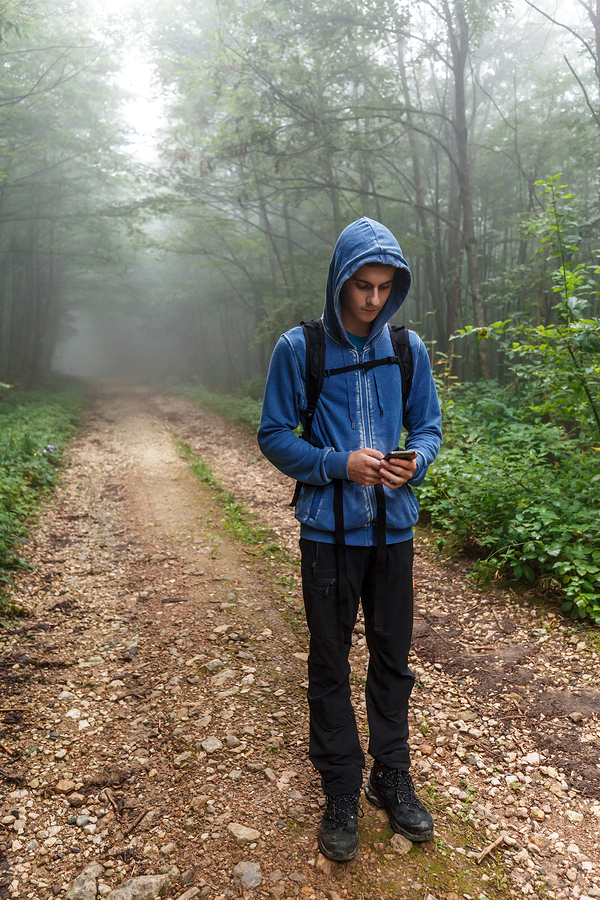Technology has changed the way that teens communicate – texting and instant messaging are now preferred over passing notes in class or even just talking on the phone – but it’s also changed the ways that parents must parent their teens.
While previously a parent might have been limited to calling friends’ houses or driving around looking for a teen that missed curfew, today’s parents can turn to their computers to get the exact location of their teen’s phone – which is usually also the exact location of their teen.
But are teen trackers the best way for you to keep tabs on your teen? Take a look at what you need to know about teen trackers and how they can help you keep track of your teenager.
Is Keeping Track of My Teen’s Location Really Just Spying?

Tracking technology can allow your teen to stay safe while camping, hiking, or participating in other activities.
The younger your children are, the more sense it makes to know exactly where they are at all times. You don’t want your 8-year-old wandering far enough away from home to get lost, for example. But as kids cross the threshold into the teen years and high school, parents often feel conflicted. Is it really OK to track your teen’s every movement? Are you keeping them safe and accountable, or interfering with their independence?
There are pros and cons to the idea of tracking, of course. It’s possible to take it too far. If you’re monitoring your teen’s every movement, there’s a good chance that you may be overdoing it. And over-monitoring can backfire. It’s normal for teens to try to break away from their parents during these years.
A teen who feels claustrophobic may resort to deception in order to achieve some independence and privacy. It’s easy for a teen to leave a phone at their friend’s house while both of them go off to some other location. Other teens may turn off the tracking themselves or even resort to keeping a secret second phone that you don’t have tracking installed on.
Tracking does more than just let you know where your teen is spending their free time. Tracking can help keep your teen safe. It can let you know where your teen is immediately in an emergency. For example, if you and your teen are separated during a natural disaster, like a hurricane or earthquake, tracking can allow you to find each other.
It’s also worth remembering that teens can be kidnapped, and tracking can help locate a teen in danger. But if your teen is feeling overly confined and devising ways to avoid being tracked, they may not have their phone on them, or their tracking active, in a situation where they might be in danger. It may be better to give your teen some space and privacy if it means that you’ll be able to access their location in a true emergency.
How Do I Talk to My Teen About Tracking?
If you decide to track your teen’s location with their phone, how do you talk to them about it? Do you talk to them about it at all? Or should you try to add a tracking app surreptitiously?
When it comes to the question of whether or not to talk to your teen about tracking, the answer is that it’s almost always better to let your teen know what you’re doing. Teens are often more tech-savvy than their parents, and even a tech-savvy parent won’t know their teen’s device as intimately as the teen who is using every day. Your teen will almost certainly eventually discover that you’re tracking them.
A better option is to have an honest discussion with your teenager. Explain why you want to use a tracking device. Outline your safety concerns and explain when and how you intend to use tracking. You don’t have to negotiate on whether or not you can track your teenager – you’re the parent, and you should make it clear that this is a non-negotiable condition of their continued use of the phone.
However, you can discuss – and be open to compromise – about how closely you’re going to track your teen’s movements and how much you can trust them to make their own decisions about where they’re going to go. You can also agree to revisit the subject periodically as your teen grows older and more mature.
When Should I Turn Tracking Off?

Does an older teen still need to be tracked, or are they ready to be on their own?
If you use a teen tracker when your teen is 13, should you still be using it when they’re 17? If not, when is the right time to turn it off?
There’s really no one correct answer to this question. In many cases, it may be best to leave the tracking on indefinitely. After all, no matter how mature your teen is, tracking still serves an important purpose when it comes to safety.
However, you may indeed want to change the way you monitor your teen’s movements as they age. A 13-year-old is in middle school or just entering high school and still needs supervision in many situations. A 17-year-old is closing in on adulthood, and may soon be leaving home, enrolling in college, or entering the workforce. By this age, you should be able to trust your teen to be responsible in their movements and honest about where they do and don’t go.
Tracking software can’t be a substitute for trust and honesty between parent and child. It’s important to talk to your teen about your concerns, about why you need to know where they are, and about why they need to be honest about what they’re doing and responsible about complying with curfews and restrictions.
What tracking can do is help you enforce your household rules, as well as protect your teen from dangers beyond their control. Every teen and every family is different and will have different tracking needs, but used judiciously, a teen tracker is a useful tool to have in your parenting toolbox.
When you choose monitoring software, you will want to make sure that you choose something that will work on all of your teen’s devices, regardless of brand. WebWatcher works on both Android and Apple devices. To find out more about how WebWatcher can work for your family, get our risk free trial.





